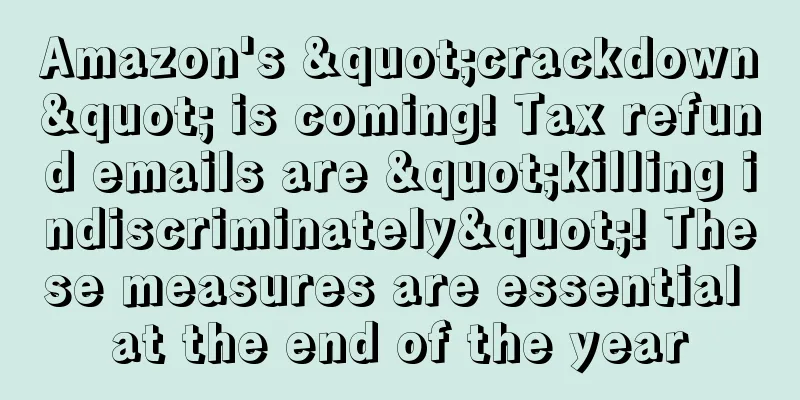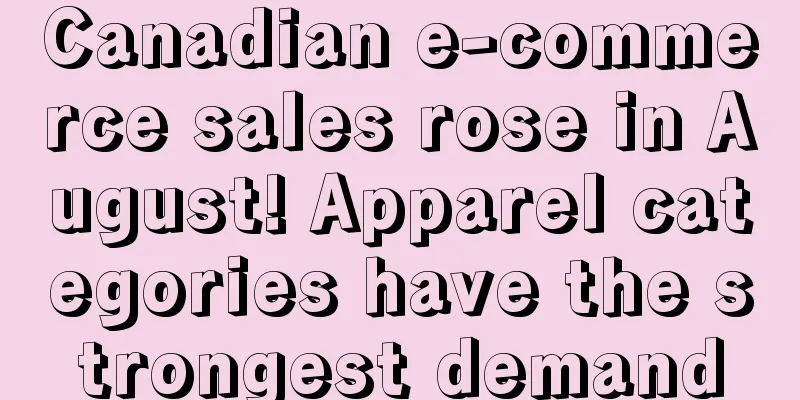Amazon's "crackdown" is coming! Tax refund emails are "killing indiscriminately"! These measures are essential at the end of the year

|
Friends who are old friends of Amazon, I believe that many people will take a deep breath before opening their accounts every day.
As the peak season arrives, it is also time for Amazon’s annual “crackdown”. Recently, many sellers have had their products removed from the shelves for various reasons, and some even had their seller accounts directly banned. For those sellers whose products have been removed from the shelves, after opening their product listings, the listings will show the following status. ↓↓↓ Changing to the status of Currently unavailable is only the first step in Amazon’s punishment against you. The dog in the picture below should be the nightmare of every Amazon seller. ↓↓↓ When this kind of page appears, it basically means that your listing is all over, and all the investment you made in this listing is in vain - there is no return. In order to find a solution to a problem that cannot be sold, you must first find the main reason why it cannot be sold. At present, the main reasons why Amazon's listings are unsalable are as follows: After uploading a new product, the default status of Amazon backend is self-delivery. If you want to switch to FBA delivery, you need to convert it yourself in the background. During the period before the conversion is completed and the goods are sent to the Amazon designated warehouse, the listing will be inactive, and this status will continue until the product is received by the Amazon warehouse. When the product is received by the Amazon warehouse, the specific time of listing will be displayed, and the seller can then place an order to purchase it. The most common situation is that all your products in the FBA warehouse have been sold out. This means that inventory planning was not done well and the product was out of stock. The impact of out-of-stock on a product is huge, as the weight that the product has accumulated previously may be interrupted. If the product can be restocked and put on the shelves within two weeks, the impact of the out-of-stock situation can be compensated. If the product is out of stock for two weeks or even longer, then the listing is basically declared invalid. Because a lot of practical experience tells us how painful it is to promote a product that has been out of stock for a long time.
On the Amazon platform, there are some rules that many domestic sellers are not used to, especially regarding intellectual property rights. Many sellers feel that Amazon's rules are too strict. In fact, this is what a normal platform should look like. All intellectual property rights should be protected, just like the money in your pocket. No one can touch it at will. On the Amazon platform, infringement must not appear anywhere, including pictures, titles, five lines, descriptions, videos, etc. If infringement occurs anywhere and is reported, the listing will immediately become unsaleable. At this time, a corresponding intellectual property warning will also appear in the performance column of the seller's backend.
In this case, you must delete the infringing factors and notify Amazon customer service in writing. The listing will be automatically restored shortly afterwards. If the infringement is too serious and cannot be restored through self-improvement, then the only option is to communicate with the complainant to seek the other party's forgiveness. If you fail to find your way down this path, your listing will eventually become useless. Amazon has strict regulations on the sales qualifications of third-party sellers, and third-party sellers are not allowed to sell many categories of products. There are also many categories of products that third-party sellers are allowed to sell, but before selling, sellers must first pass Amazon's category review. Products that require category review generally belong to categories that are closely related to human life and health , such as many products in the children's category, the auto parts category, and the beauty category. However, there are hundreds of millions of products on the Amazon platform, and many products do not require pre-sales review when they are uploaded. However, during the product operation process, it is necessary to provide mid-sales review information. If there is no review during the sales process, the seller may never know that this product still needs category review. However, the strange thing is that the notification of category review came just after the product arrived and was put on the shelves. Before you pass the review, your product will naturally become unsaleable. If the audit goes smoothly, you can continue selling the products after it passes. If you are unlucky and the audit fails, the products in the warehouse can only be contributed to American charity. Recently, many sellers said they received tax refund emails from the European tax authorities. It’s the end of the year, sellers should check their mailboxes more often. It’s really a loss to be blocked due to tax issues during the peak season! Some sellers said that they had just completed an investigation and all historical sales would be taxed at the normal 20% rate. Some sellers also said that their store was suspended after just one order, and they could only continue selling after registering for VAT. It is really difficult to maintain an account. Many sellers know that VAT declaration in Europe means they need to pay a large sum of money to the European tax authorities. Although it is not pleasant, the cost of not declaring truthfully is also very serious. After all, tax compliance is the general trend. At the end of the year, not only is tax mail "crushing", but warehousing logistics is also a problem. In addition to stockpiling supplies for Christmas and any possible coronavirus-related lockdowns, Europe and the UK will soon face Brexit. Under the triple squeeze, European warehousing pressure has risen sharply. The growth of e-commerce throughout the year has pushed warehousing space to its limits due to the impact of the COVID-19 pandemic. "During the first wave, most airlines were already operating at Christmas volumes." David Schroeder, chief financial officer of European e-commerce retailer Zalando, said in November that if the Christmas effect is now put first, it will become more challenging.
In addition, demand for storage space is likely to soar further after Brexit as retailers try to avoid customs checks and, if no deal is reached, evade tariffs. British companies are now trying to get as much goods into the country as possible ahead of potential business disruptions in January, while their European counterparts are stockpiling goods in pan-European distribution hubs near ports such as Hamburg or Rotterdam, Reuters reported.
Even after the pandemic , demand for warehouse space is expected to remain high as customers, now accustomed to ordering online, continue to do so. E-commerce typically requires about three times as much warehousing capacity as physical retail, according to Prologis. |
<<: Out of stock warning! More than 700 million packages delayed! All shipping prices skyrocketed...
Recommend
Will the store be dead if triggered? Amazon adopts a new review mechanism!
Click on the blue name above to follow us! Recent...
What is Anker? Anker Review
Anker Innovations (Anker) was founded in 2011. It ...
Beware! Amazon's best-selling products have become the first to be closed down, and 39 accounts in Shenzhen have been frozen!
2021 is already midway. If we were to pick a keywo...
What is a patent pool? Patent pool review
Patent Pool: It is a patent licensing trading plat...
What are Gift Options? Gift Options Review
Gift Options include Gift Messaging & Gift-Wra...
Rampant! Freight forwarder threatens seller: "I will destroy your Amazon store!"
Some sellers concluded that in the cross-border e...
What lessons can the collapse of cross-border retail giant Mocan bring to the entire industry?
Since Amazon started blocking accounts, They keep ...
Amazon sweeps numbers on a large scale! It is difficult to appeal against violations of merged variants, sellers should hurry up and withdraw funds!
In the early morning of May 11, Amazon began to st...
Under the pressure of high inflation, the growth rate of US holiday season sales will slow down to 4%-6%!
<span data-docs-delta="[[20,"获悉,根据德勤(Deloi...
What is a secondary link? Secondary Link Evaluation
As the name implies, a secondary link requires two...
What is outofstock? Outofstock Review
Outofstock was founded in Hong Kong in 2007 and cr...
Latest survey: Strict return policies affect nearly 70% of American consumers' purchasing intentions
It is learned that on September 18, according to f...
What is Jianyihui? Jianyihui Review
Jianyihui is a comprehensive service platform inte...
What is Posti: The National Postal Service of Finland? Posti: The National Postal Service of Finland Review
Posti is a state-owned postal group that provides ...
Etsy's customer traffic continues to decline! Will the fourth quarter be able to reverse the downward trend?
It is learned that according to foreign media repo...









